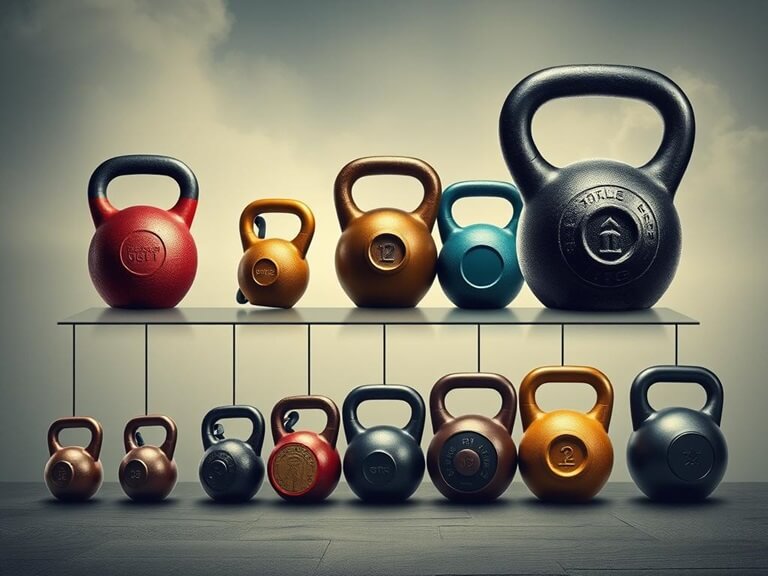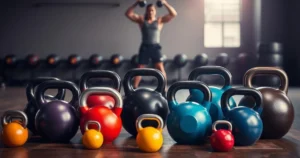I’ve been looking into fitness and found something amazing: kettlebells. These weights look like cannonballs but have handles. They’re changing workouts in the U.S. in a big way.
Kettlebells are unique because of their design. The off-center weight allows for a smooth swing, which works many muscles at once—a workout that dumbbells can’t match.
They’re great for working out your whole body. You can use them at home, the gym, or the beach.
Kettlebells are super versatile. They can boost your strength, flexibility, and heart health—it’s like having a gym in your hand. Plus, kettlebell workouts are quick and effective.
So, discover what Are Kettlebells.
Key Takeaways
- Kettlebells combine strength and cardio training.
- Off-center mass design enables unique full-body movements.
- Versatile for various workout locations.
- Improves strength, flexibility, and cardiovascular fitness.
- Efficient for time-saving, effective workouts.
The Origins and Evolution of Kettlebells

Kettlebells started in 18th-century Russia. Farmers first used them to weigh grain. Now, they are a crucial part of fitness.
Their design, with the weight off-center, makes them unique. It helps to build strength uniquely.
From Russian Farmers to Modern Fitness
In 1885, Russia had its first kettlebell lifting contest. This was the start of a significant change in fitness. By 1948, kettlebells were a big part of Russian culture.
The Soviet Union found ways to use kettlebells for strength and endurance. This was a big step forward.
Design and Construction Features
Kettlebells in Russia can weigh from 4 to 100 pounds. These cater to all fitness levels. Their shape makes it easy to move in many ways.
This helps improve physical skills and targets the body’s center of gravity.
Why the Cannonball with a Handle Design Matters
The kettlebell’s shape makes it very useful for training. It allows for swings, snatches, and Turkish get-ups. These are hard to do with regular weights.
This design helps build strength for everyday life and sports.
| Year | Milestone |
|---|---|
| 1700s | Kettlebells were first used in Russia |
| 1885 | First kettlebell lifting competition in Russia |
| 1948 | All-Union Kettlebell Lifting Federation established |
| 2001 | “Russian Kettlebell Challenge” book published |
| Present | Global popularity in fitness and sports training |
What Are Kettlebells: Understanding the Basics
Kettlebells are versatile tools with a long history. They first appeared in Russian dictionaries in 1704, serving as counterweights for grain.
Anatomy of a Kettlebell
A kettlebell is a metal ball with a handle. Its design makes it hard to balance. It has a handle, horns, a bell, and a flat base.
- Handle: For gripping and swinging
- Horns: The sides of the handle.
- Bell: The round-weight part
- Flat base: Allows the kettlebell to stand upright.
Different weight options and sizes.
Kettlebells come in various weights, usually in kg. Beginners should start with one. Men can use a 16 kg (35 lb) kettlebell, while women might begin with an 8 kg (17.5 lb).
You can try heavier ones, up to 48 kg or more, as you get better.
Cast Iron vs. Competition Kettlebells
There are two main types of kettlebells:
| Cast Iron Kettlebells | Competition Kettlebells |
|---|---|
| Vary in size with weight | Uniform size regardless of weight |
| Suitable for general fitness | Used in kettlebell sports competitions |
| Often have a textured handle | Smooth handle for quick transitions |
| More affordable | Higher price point |
Kettlebells work out your whole body. They use over 600 muscles, boosting strength, cardio, and flexibility. They can also help with back pain and joint stability when appropriately used.
The Science Behind Kettlebell Training
Kettlebell training is supported by solid science. It engages many muscle groups at once, boosting full-body strength and coordination.
Kettlebells come in weights from 3 to 100 pounds. They suit everyone’s fitness level. Kettlebell swings, even with light weights, can match heavy jump squats in power.
A study looked at 829 records and found 99 good studies. It showed that kettlebell training improves strength, power, and endurance. Military and law enforcement use kettlebells for training.
| Aspect | Finding |
|---|---|
| Publications focused on hardstyle training | 50% |
| Records identified for review | 829 |
| Publications meeting inclusion criteria | 99 |
| Article Altmetric score | 42 |
Kettlebell exercises also improve core stability and heart health. The movements raise heart rate, offering excellent heart health benefits. Universities are studying kettlebells for ACL prevention and musculoskeletal disorders.
Kettlebells are changing fitness routines. They are a cost-effective option compared to traditional weights. They deliver excellent results in strength, power, and endurance.
Essential Kettlebell Movements and Techniques
Learning essential kettlebell exercises can change your workout. The main ones are the kettlebell swing, Turkish get-up, snatch, and clean and press. These exercises work many muscles at once, giving you a full-body workout.
The Fundamental Kettlebell Swing
The kettlebell swing is a crucial exercise. It works your legs, core, chest, and shoulders. Aim for 10 to 15 reps in 45 seconds, rest for 15 seconds, and repeat for five sets. It builds power and endurance without hurting your joints.
Turkish Get-ups and Snatches
Turkish get-ups boost coordination and stability. They’re complex but worth it. Snatches, meanwhile, improve explosive power. Do ten reps, then switch arms and repeat. These exercises make your body stronger in different ways.
Clean and Press Variations
The clean press strengthens your upper body and core. For the kettlebell clean, do three sets of 8 reps. Aim for three sets of 8 to 10 reps per side for the overhead press with little rest. These exercises help build functional strength and power.
Proper Form and Safety Guidelines
Proper form is critical when doing kettlebell exercises. Start with a weight you can control. Beginners should use 10 to 15 pounds. Always keep your core tight and back straight, and breathe well. Learning from certified instructors or good tutorials helps avoid injuries.
Benefits of Incorporating Kettlebells in Your Workout
Adding kettlebells to my workouts has changed my fitness journey. They combine strength, cardio, and mobility, making them great for working out the whole body.
Full-Body Strength Development
Kettlebell exercises work many muscles at once. I’ve seen significant gains in my core and back muscles. For newbies, start with 8-15 lbs for women and 15-25 lbs for men.
As you get stronger, add more weight to keep challenging yourself.
Cardiovascular Conditioning
Kettlebell workouts are great for your heart. Swings and snatches raise your heart rate—it’s like running at a 6-minute mile pace.
I do 6–7 sets of swings to get the most cardio benefits.
Flexibility and Mobility Improvements
Kettlebell training has made me more flexible. Moves like the Turkish get-ups and squats have helped my hips and ankles. I do 3-4 squats and lunges to focus on these areas.
To stay safe and get the most out of kettlebells, follow these tips:
- Start with lighter weights and focus on proper form.
- Increase intensity and weight step by step.
- Perform kettlebell workouts 2 to 3 times a week.
- Begin with 6-8 repetitions per exercise, adding more sets as strength improves.
Kettlebells have given me a balanced workout. They combine strength, cardio, and mobility in one efficient package.
Kettlebells vs. Traditional Training Tools
I’ve tried many gym tools, like dumbbells and barbells. But kettlebells are special. They move in a way that works many muscles at once.
Studies show kettlebells are very effective. Women who used them got 84.25% stronger in their arms and 28.4% more flexible. These gains beat many old-school workouts.
Kettlebells are better than other tools for building real-world strength and heart health. A study showed they can boost jump and squat strength as much as heavy lifting. This is a big win.
| Exercise Type | Strength Increase | Cardiovascular Benefit |
|---|---|---|
| Kettlebell Training | 4.5% (Back Squat) | 93% of Max Heart Rate |
| Barbell Training | 13.6% (Back Squat) | Varies by Exercise |
| Machine Weights | Limited Core Engagement | Minimal |
Kettlebells are great because they’re versatile and save space. They can replace many machines, perfect for small gyms or home workouts. Plus, they offer strength and cardio benefits in one move.
Getting Started with Kettlebell Training
I’m excited to share my journey into kettlebell training. Choosing the right starting weight was vital for me. Women new to weight training should begin with an 18-pound kettlebell, and men can start with 35 pounds.
These weights help you learn proper technique without getting too tired.
Related: Kettlebell Training for Beginners
Choosing Your First Kettlebell
When picking my first kettlebell, I looked for durability and grip. Cast iron and steel kettlebells are good choices. The handle should be more comprehensive than your hand with fingers spread.
Workouts Suitable for Beginners
I started with basic movements to build a solid foundation. Here’s a simple workout I found compelling:
- Kettlebell swings: 3 sets of 10 reps.
- Goblet squats: 3 sets of 8 reps.
- Rows: 3 sets of 12 reps per arm.
- Deadlifts: 3 sets of 10 reps.
I aimed for 1-2 kettlebell sessions per week. Rest for 30-60 seconds between sets. This helped me get stronger and avoid injuries.
Common Mistakes to Avoid
Learning proper technique is critical to avoiding injuries. Use muscle power, not momentum. Working with a certified kettlebell instructor helped me get my form right. Safety is always first in kettlebell training.
| Mistake | Correction |
|---|---|
| Using momentum instead of muscle power | Focus on controlled movements |
| Neglecting proper form | Work with a certified instructor |
| Starting with too-heavy weights | Begin with recommended starting weights |
| Skipping warm-up | Always warm up before training |
Conclusion
I’ve looked into kettlebells, and I find them quite impressive. They’ve changed how we work out. Starting in 18th-century Russia, they’re a crucial part of home workouts.
Kettlebells are great because they work your whole body. You can swing, snatch, or press them. This means you’re working many muscles at once. It’s perfect for busy people who want to stay fit fast.
Kettlebells are for everyone, no matter your fitness level. Beginners can start simple and get better over time. They help improve posture, build muscle, boost heart health, and even help to lose fat. It’s easy to see why they’re so popular in fitness.
If you have yet to try kettlebells, you should. With the right help and practice, they could become your go-to workout tool. Don’t wait to start your kettlebell journey and improve your workouts.


